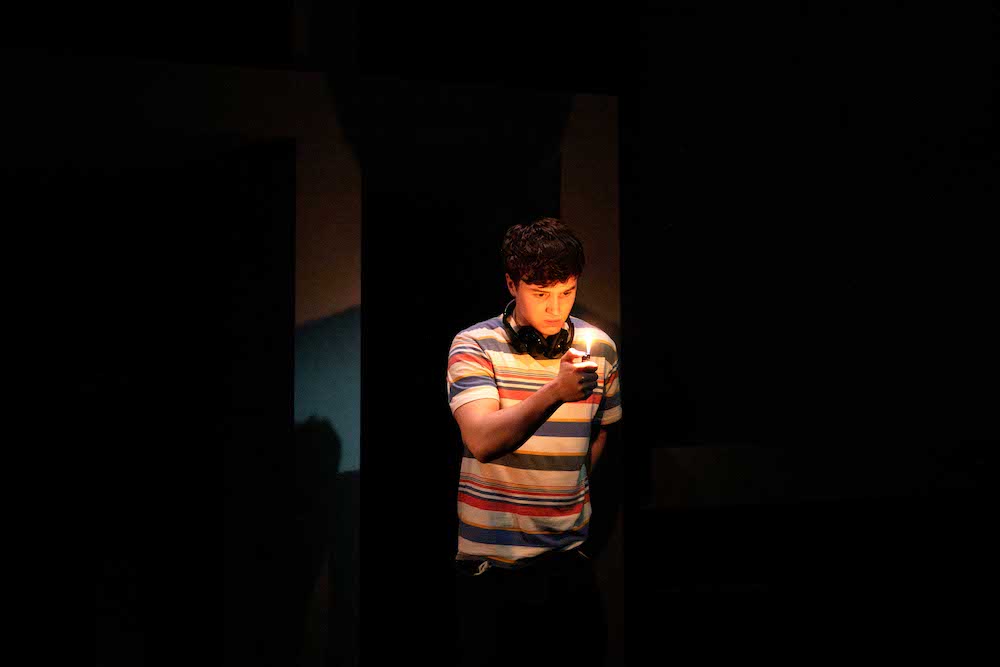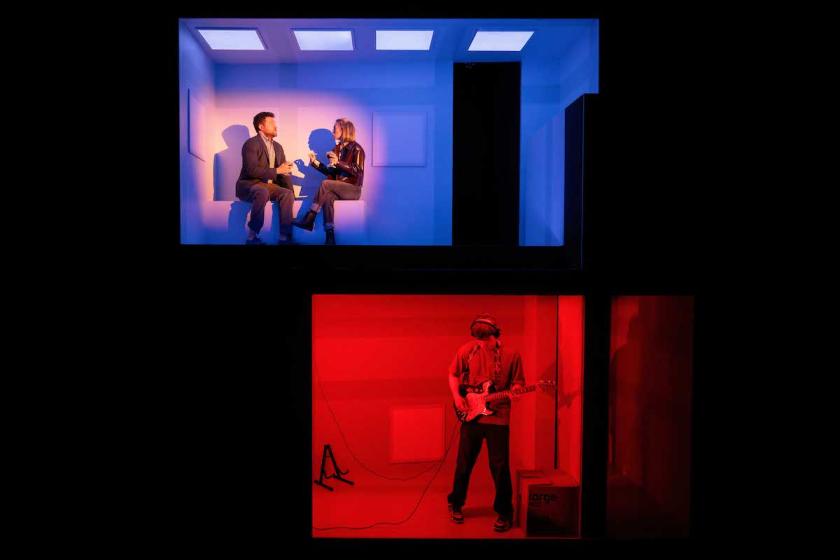Niall is unwell. Very unwell. Very, very. There’s a lot going on in his head. He can’t really hold things together. Evidence? Well, he’s lost his job and his girlfriend Natalie has left him. So, as desperation increases, he decides to phone his big sister Brigid – the trouble is, it’s 3 o’clock in the morning.
When he wakes her up he’s a bit tongue-tied, and things go badly. Very badly. He’s not very good at small talk and she’s upset about being disturbed (someone is staying the night with her). They hang up, and the next thing he does is set fire to his hand. The consequences of this desperate act are then played out in Eoin McAndrew’s dramedy, which won the Verity Bargate Award last year and now gets a cracking production on the Soho Theatre’s main stage.
In the next scene, Niall is being treated for burns in hospital, while a weird young female doctor tells Brigid not only about her little brother, but also random facts about the high rates of self-immolation in Northern Ireland, the availability of a specialist self-help group and the long waiting lists for counselling. Her excitable chattering, and constant points about the politically correct way to talk about what Niall has done, lend a heightened comic aspect to a story that is otherwise very serious: as is obvious, Niall is very unwell.  This sharp mixture of the awful and the absurd continues as Naill moves in with Brigid, who works in an office, but is determined to help him. At first, their interaction is understandably a bit spiky: she has installed a new smoke alarm in case he tries to set fire to himself again, and has had to remove anything at all that can ignite flammable materials. He’s a bit bewildered by these precautions, then he’s made sleepy by his medication. It’s a strange living situation. At one point, when Brigid returns to find him watching the ending of The Wicker Man, she freaks out – but he’s cool about it. It’s also a comic highpoint.
This sharp mixture of the awful and the absurd continues as Naill moves in with Brigid, who works in an office, but is determined to help him. At first, their interaction is understandably a bit spiky: she has installed a new smoke alarm in case he tries to set fire to himself again, and has had to remove anything at all that can ignite flammable materials. He’s a bit bewildered by these precautions, then he’s made sleepy by his medication. It’s a strange living situation. At one point, when Brigid returns to find him watching the ending of The Wicker Man, she freaks out – but he’s cool about it. It’s also a comic highpoint.
The life of the two siblings is explored through scenes which show Brigid attempting to raise Niall’s self-esteem by writing post-it notes about his good qualities, then eventually prepping him for a job interview, then being there for him when he has a horrifying meltdown. Although we never really get inside his head, like Brigid and her boyfriend Michael Doran, who are both mystified about what he’s experiencing, there are snapshots of the noise inside him as he plays rock guitar, isolated in a world bound by headphones and acute loneliness. Can we ever, the play asks, really know what’s happening inside the heads of our nearest and dearest?
While Brigid takes on the role of carer with initial enthusiasm, almost like a project, she soon realizes how difficult this is. Niall is evasive and needy, and prone to some extremely disturbing episodes. But as their relationship evolves over the space of some two years in this well-paced 90-minute play, the mutual dependency of the siblings becomes more and more acute, until Niall is forced to complain that she needs him as much as he needs her. By contrast, Michael Doran becomes increasingly resentful of the time that Brigid spends with her brother, even when he moves out, with the constant phone calls and the constant demands on her attention. His jealousy is palpable.
As well as many literally hilarious scenes, anything from an awkward lads night for Niall and Michael Doran to an excruciating marriage proposal, Little Brother also includes an amusingly offbeat criticism of the inadequacies of the mental health system in Northern Ireland, with its long waiting lists and rather unhinged individuals working for it (the same can I’m sure be said about the rest of the UK). But while the comedy of the relationship between the siblings and Michael Doran powers the story along, there are also plenty of moments when Niall’s desire to self-harm comes to the fore. There’s real sadness here too.
Emma Jordan’s excellent high-definition production takes place on Zoë Hurwitz’s multi-level and vividly colourful set, whose strong compartmentalisation suggests the loneliness of the mentally ill, and says something about how we all box off parts of our lives. The darkly humorous story is superbly acted by Cormac McAlinden’s Niall (pictured above), who convincing shows both the awkward vulnerability and the unconscious selfishness of his troubled character, while by contrast Catherine Rees excels in conveying both her compassion for, and her frustration with, the troubled loved one. As the outsider Michael Doran, Conor O’Donnell perfectly portrays the uneasy limits of compassion. Finally Laura Dos Santos plays several health professionals with lots of comic verve.
Little Brother is written with real brightness and its energetic comedy contrasts brilliantly with its, often unspoken, seriousness. I love the passage about the country’s politics – and its kooky solution to age-old community prejudices. As a picture of two siblings, McAndrew’s dramedy works really well, showing how the desire to care can also be a need to control, and how self-sacrifice and self-loathing are psychological companions. At the same time, it is entertaining as well as thought provoking, and this production has both emotional truth and some great laughs.















Add comment